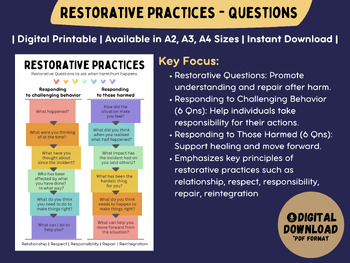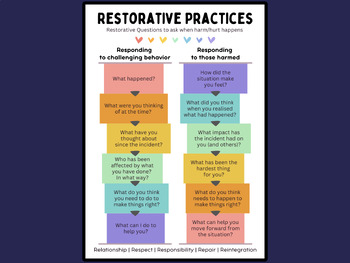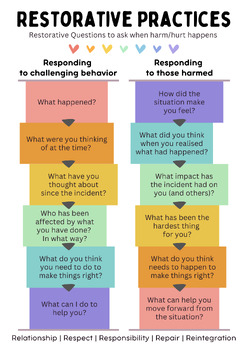Restorative Justice / Practices Poster - Question Prompts (Victim and Offender)
Description
This printable poster, “Restorative Practices - Restorative Questions to ask when harm/hurt happens” is designed to be a helpful resource for anyone who wants to implement restorative practices. It's ideal for classrooms, hallways, common areas, or any space where fostering a positive and accountable environment is desired.
Here's a breakdown of the poster's content and its uses:
Responding to Challenging Behavior:
This section provides a list of six restorative questions to ask someone who has exhibited challenging behavior. These questions encourage reflection, taking responsibility, and considering how to repair the situation.
When to Use: When a student or individual has behaved disruptively, caused harm, or violated expectations.
How to Use: Ask the questions calmly and openly, allowing the person time to reflect and respond thoughtfully. Use the answers to guide a conversation about making amends and preventing future incidents.
Responding to Those Harmed:
This section offers six restorative questions for those who have been affected by the challenging behavior. These questions help them express their feelings, understand the impact, and explore ways to move forward constructively.
When to Use: After addressing the challenging behavior, use these questions to understand the perspective of those who were harmed.
How to Use: Ask the questions with empathy and allow them space to share their experience. Use the answers to facilitate a restorative conversation that focuses on healing and reconciliation.
The poster highlights five key restorative practices principles:
- Relationship: Building positive connections is essential for resolving conflict peacefully.
- Respect: Treating everyone with dignity is a foundation for a healthy community.
- Responsibility: Taking ownership of actions and their consequences fosters accountability.
- Repair: Finding ways to address the harm caused by challenging behavior.
- Reintegration: Rebuilding trust and restoring the individual to the community.
How it can be helpful:
- Promoting Restorative Practices: Offers a structured approach to addressing harm and conflict, emphasizing understanding, empathy, and accountability.
- Guiding Conversations: Provides specific questions to facilitate dialogue between those responsible for harm and those impacted, fostering communication and reconciliation.
- Educational Tool: Serves as a visual aid for teaching restorative principles and techniques in classrooms, workplaces, or community settings.
- Quick Reference: Acts as a handy reference guide during restorative processes, ensuring that important questions are not overlooked.
- Encouraging Accountability: Encourages individuals to take responsibility for their actions and consider the impact on others, promoting personal growth and accountability.
Product Specifications:
- Format: Digital Printable
- Sizes: Available in A2, A3, and A4
- Download: Instant Download (allows for easy printing)
This "Restorative Practices Questions" poster is a valuable tool for promoting / implementing restorative practices and fostering empathy, accountability, and reconciliation in various social contexts.




